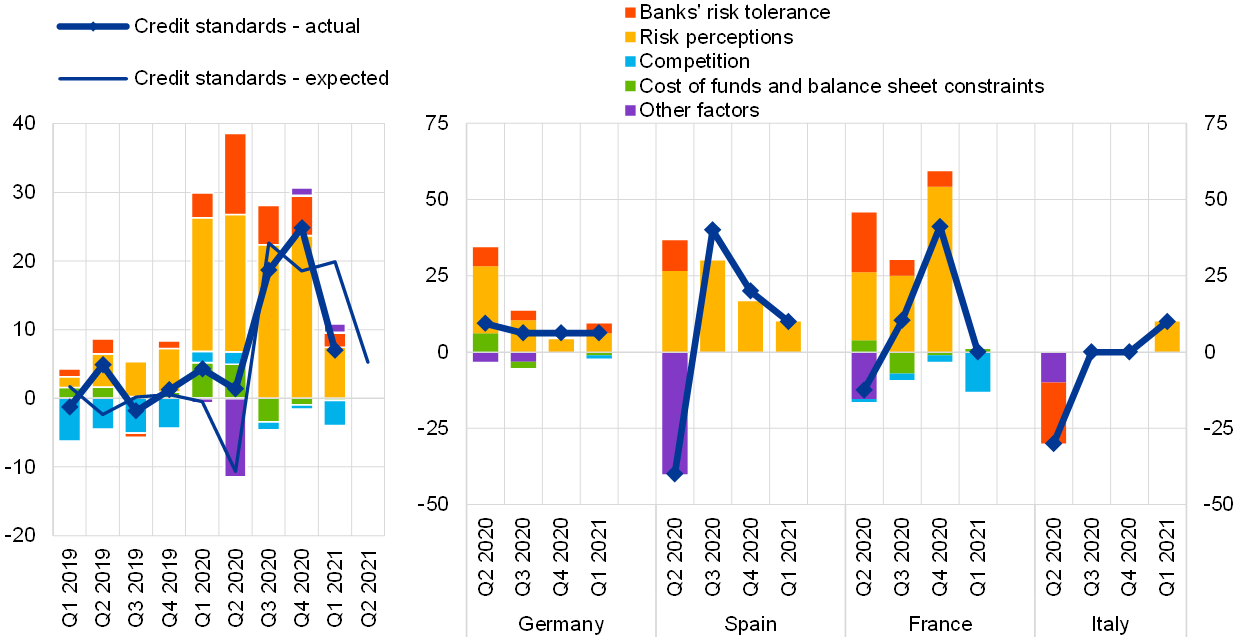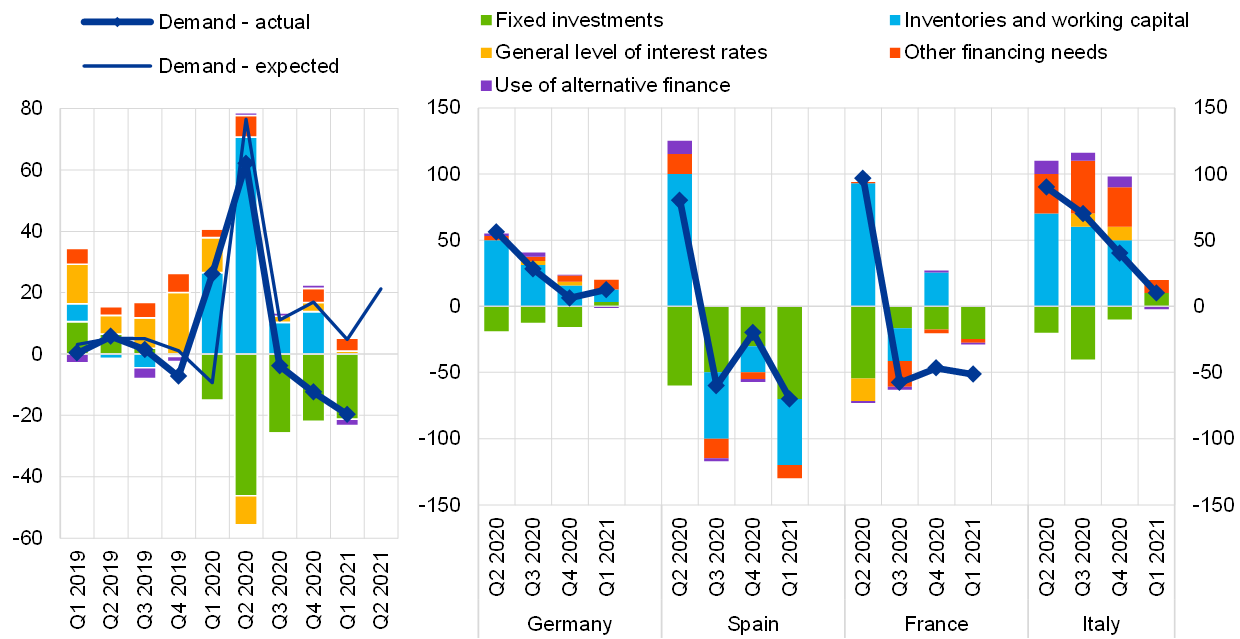- PRESS RELEASE
April 2021 euro area bank lending survey
20 April 2021
- Credit standards for loans to firms tightened moderately
- Demand for loans by firms and households decreased
- ECB’s monetary policy measures remain supportive of lending conditions and volumes
According to the April 2021 euro area bank lending survey (BLS), credit standards – i.e. banks’ internal guidelines or loan approval criteria – tightened moderately for loans or credit lines to enterprises (net percentage of banks standing at 7%, see Chart 1) in the first quarter of 2021. Credit standards eased slightly in net terms for loans to households for house purchase (net percentage of -2%) and tightened moderately further in net terms for consumer credit and other lending to households (net percentage of 5%). Banks referred mainly to risk perceptions related to borrowers’ creditworthiness and a lower risk tolerance as factors having a tightening impact on their credit standards. By contrast, competitive pressure contributed mostly to an easing of credit standards. In the second quarter of 2021, banks expect credit standards to tighten for loans to firms and households.
Banks’ overall terms and conditions – i.e. the actual terms and conditions agreed in loan contracts – remained unchanged for loans to firms and eased, on balance, for housing loans in the first quarter of 2021. In both cases, margins on average loans narrowed while banks reported wider margins for riskier loans in net terms.
Banks reported, on balance, a further decline in firms’ demand for loans or drawing of credit lines in the first quarter of 2021, i.e. a larger percentage of banks indicated a decline rather than an increase in firms’ loan demand (see Chart 2). Financing needs for fixed investment continued to dampen loan demand as firms, especially in sectors more affected by the pandemic, tended to postpone investment. In addition, firms did not, on balance, demand additional financing for working capital, reflecting the availability of liquidity buffers and direct government liquidity support, especially to small and medium-sized enterprises. Banks also reported a net decrease in demand for housing loans in the first quarter of 2021. While consumer confidence dampened demand for housing loans, demand continued to be supported by the low general level of interest rates and, to a lesser extent, housing market prospects. For consumer credit and other lending to households, a larger net percentage of banks reported a decline in demand, driven mainly by lower consumer confidence and decreased spending on durable goods. In the second quarter of 2021, banks expect net demand to increase for loans to firms and households.
Euro area banks’ access to retail and wholesale funding continued to improve in the first quarter of 2021, according to the banks surveyed. The BLS also asked banks to report on the impact of the ECB’s monetary policy measures on bank lending. The ECB’s asset purchase programme (APP), the pandemic emergency purchase programme (PEPP) and the third series of targeted longer-term refinancing operations (TLTRO III) all had a positive impact on banks’ liquidity positions and market financing conditions. These measures, as well as the ECB’s negative deposit facility rate, had an easing impact on bank lending conditions and a positive impact on lending volumes, mainly for loans to firms. TLTRO III in particular has strongly supported bank lending over the past six months. At the same time, banks indicated a negative impact of the ECB’s asset purchases and the negative deposit facility rate on their profitability through a negative impact on their net interest income. This was mitigated by the ECB’s two-tier system for remunerating excess liquidity holdings.
The euro area bank lending survey, which is conducted four times a year, was developed by the Eurosystem in order to improve its understanding of bank lending behaviour in the euro area. The results reported in the April 2021 survey relate to changes observed in the first quarter of 2021 and expected changes in the second quarter of 2021, unless otherwise indicated. The April 2021 survey round was conducted between 11 and 26 March 2021. A total of 143 banks were surveyed in this round, with a response rate of 100%.
For media queries, please contact Silvia Margiocco, tel.: +49 69 1344 6619.
Notes
- A report on this survey round is available on the ECB`s website. A copy of the questionnaire, a glossary of BLS terms and a BLS user guide with information on the BLS series keys can be found on the same web page.
- The euro area and national data series are available on the ECB’s Statistical Data Warehouse. National results, as published by the respective national central banks, can be obtained via the ECB`s website.
- For more detailed information on the bank lending survey, see Köhler-Ulbrich, P., Hempell, H. and Scopel, S., “The euro area bank lending survey”, Occasional Paper Series, No 179, ECB, 2016.
Chart 1
Changes in credit standards for loans or credit lines to enterprises, and contributing factors
(net percentages of banks reporting a tightening of credit standards, and contributing factors)

Source: ECB (BLS).
Notes: Net percentages are defined as the difference between the sum of the percentages of banks responding “tightened considerably” and “tightened somewhat” and the sum of the percentages of banks responding “eased somewhat” and “eased considerably”.
Chart 2
Changes in demand for loans or credit lines to enterprises, and contributing factors
(net percentages of banks reporting an increase in demand, and contributing factors)

Source: ECB (BLS).
Notes: Net percentages for the questions on demand for loans are defined as the difference between the sum of the percentages of banks responding “increased considerably” and “increased somewhat” and the sum of the percentages of banks responding “decreased somewhat” and “decreased considerably”.
Europese Centrale Bank
Directoraat-generaal Communicatie
- Sonnemannstrasse 20
- 60314 Frankfurt am Main, Duitsland
- +49 69 1344 7455
- media@ecb.europa.eu
Reproductie is alleen toegestaan met bronvermelding.
Contactpersonen voor de media

